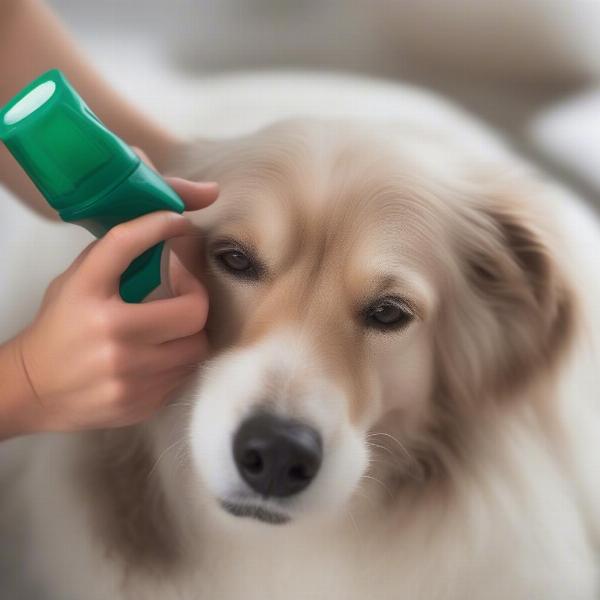Spray for dogs encompasses a wide range of products, from flea and tick prevention to wound care and even grooming sprays. Choosing the right spray depends on your dog’s specific needs and can significantly impact their health and well-being. This guide explores various types of dog sprays, their uses, and important considerations for safe and effective application.
Understanding Different Types of Sprays for Dogs
Dog sprays cater to a variety of needs.  Flea and tick spray being applied to a dog Flea and tick sprays are crucial for parasite prevention, protecting your dog from potentially dangerous diseases. Antibiotic sprays aid in wound healing and prevent infections. Grooming sprays can detangle fur, add shine, and even offer sun protection. It’s essential to choose a spray specifically formulated for dogs to avoid potential harm from ingredients unsuitable for canine skin and fur.
Flea and tick spray being applied to a dog Flea and tick sprays are crucial for parasite prevention, protecting your dog from potentially dangerous diseases. Antibiotic sprays aid in wound healing and prevent infections. Grooming sprays can detangle fur, add shine, and even offer sun protection. It’s essential to choose a spray specifically formulated for dogs to avoid potential harm from ingredients unsuitable for canine skin and fur.
Flea and Tick Sprays: Protecting Your Canine Companion
fly spray for dogs are essential for preventing infestations and the transmission of diseases like Lyme disease and ehrlichiosis. These sprays typically contain insecticides that kill and repel fleas and ticks. Always follow the product instructions carefully, paying attention to the recommended application frequency and dosage.
Wound Care Sprays: Promoting Healing and Preventing Infection
antibiotic spray for dogs can be used on minor cuts, scrapes, and abrasions to prevent infection and promote healing. These sprays often contain antiseptic and antibacterial ingredients. However, it’s crucial to consult a veterinarian for serious wounds or deep lacerations.
Grooming Sprays: Enhancing Your Dog’s Coat
frontline spray for dogs offer a convenient way to maintain your dog’s coat health and appearance. Detangling sprays can ease brushing and prevent matting, while conditioning sprays add shine and moisture. Some grooming sprays also offer UV protection, shielding your dog’s skin from the harmful effects of the sun.
Choosing the Right Spray for Your Dog
Selecting the right spray involves considering your dog’s age, breed, size, and specific needs. Puppies and senior dogs may require gentler formulations. Some breeds are more susceptible to certain skin conditions, necessitating specific spray types. Always check the product label to ensure it’s suitable for your dog’s age and breed.
Safety Considerations When Using Sprays
When applying any spray to your dog, ensure adequate ventilation and avoid contact with the eyes, nose, and mouth. Wear gloves to protect your skin and wash your hands thoroughly after application. If your dog shows any signs of irritation or an allergic reaction, such as redness, itching, or swelling, discontinue use and consult a veterinarian.
Conclusion
Choosing the correct spray for dog can significantly contribute to their overall health, hygiene, and comfort. By understanding the various types of sprays available and following safety guidelines, you can ensure your canine companion benefits from these helpful products. Remember to consult with your veterinarian if you have any concerns or questions about which spray is best for your furry friend.
FAQ
- How often should I apply flea and tick spray to my dog? The frequency of application varies depending on the product. Always follow the manufacturer’s instructions.
- Can I use human antibiotic spray on my dog? No, human antibiotic sprays may contain ingredients that are harmful to dogs. Always use sprays specifically formulated for canines.
- What should I do if my dog licks the spray after application? Contact your veterinarian immediately for advice.
- Are grooming sprays necessary for all dogs? While not strictly necessary, grooming sprays can help maintain coat health and address specific needs like detangling or sun protection.
- Can I use multiple types of sprays on my dog? Yes, but avoid applying different sprays to the same area simultaneously. Consult your vet if you are unsure about combining products.
- Where can I purchase dog sprays? Dog sprays are available at pet stores, veterinary clinics, and online retailers.
- Are there natural alternatives to chemical-based sprays? Yes, some natural sprays utilize essential oils and other plant-based ingredients. However, always research thoroughly and consult your vet before using any new product.
About ILM Dog
ILM Dog is your trusted international resource for expert advice on all aspects of dog care and ownership. From breed selection and puppy care to senior dog health and training tips, we offer comprehensive, practical guidance to dog lovers worldwide. We specialize in providing reliable information on dog breeds, health and medical care, training and behavior, nutrition, grooming, exercise, and much more. ILM Dog is dedicated to helping you provide the best possible care for your canine companion. Contact us for any inquiries: Email: [email protected], Phone: +44 20-3965-8624.